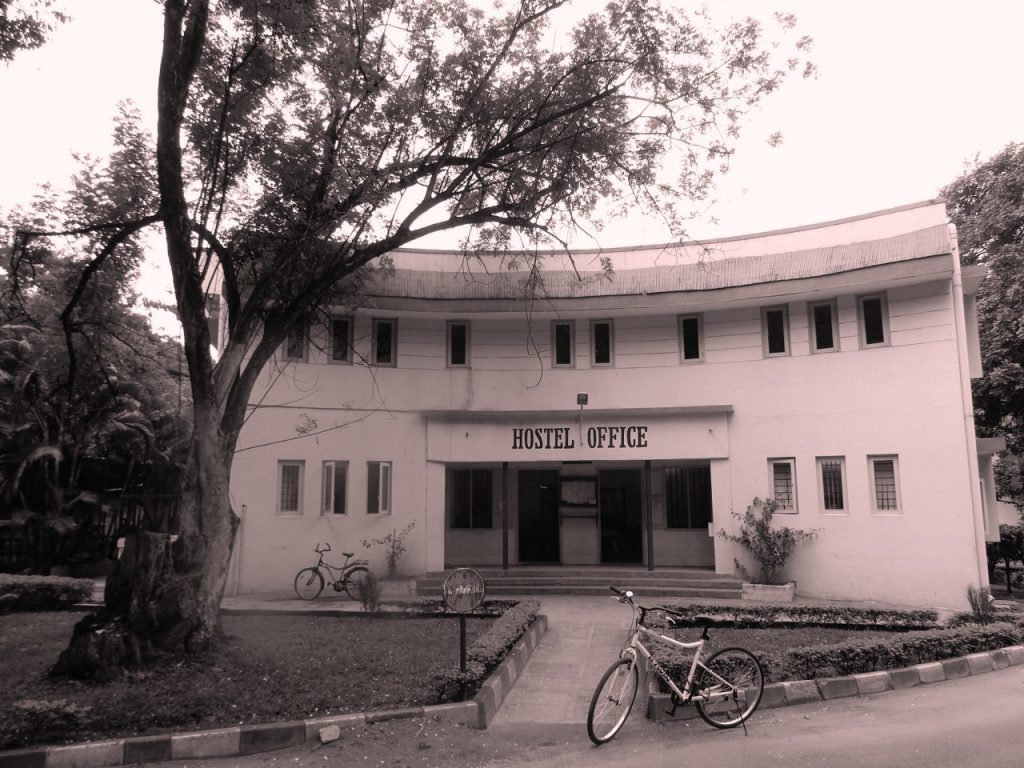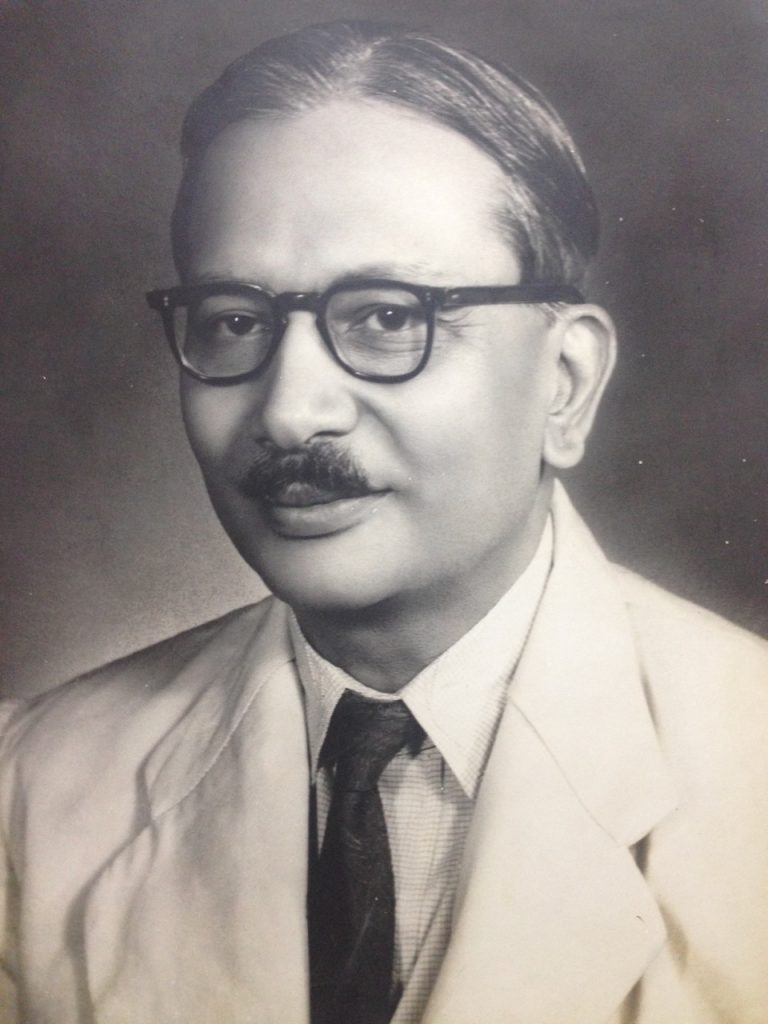M Jagannadha Rao’s 1943 missive against having a Common Dining Hall

In 1943, construction began on a new dining hall and auditorium designed by Otto Koenigsberger, meant to serve as a common dining hall for all students. It was meant to replace the nine messes on campus in which students ate with their respective communities or according to the dictates of their caste and religion, but not everyone welcomed the idea. Here is a letter written on 12 March 1943 by M Jagannadha Rao, a student who went on hunger strike in protest against the management’s decision to have a common dining hall. Addressed to the Director at the time, JC Ghosh, the letter is long, impassioned, and – with the benefit of hindsight – on the wrong side of history.
* * *
Dear Sir,
I write this letter after a day’s fast. I feel weak enough to pen this letter physically but I find myself strong enough morally to undertake this ordeal. I cannot convince my own conscience that I am undertaking this fast on such an apparently simple issue of a Common Dinwing Hall. It is not a question of prestige. It is a question of reason to me. The Common Dining Hall issue seems to me the final culmination point of a series of injustices done to students against their wishes in the matter of curtailment of their liberties.
Before I came to the Institute I lived in three of the leading Universities in India. Even then it is easy for me to realise that the system of messing here and the management of the hostel entirely on democratic principles by the students themselves is the best I have so far seen and is consistent with the nature of the responsible students admitted here. But I saw this system crumbling before my very presence without my being able to prevent it. A gradual curtailment of facilities and a slow crushing of our independence followed with a stern hand. The Hostel Presidentship was managed to be taken over first. It was followed by the appointment of a Warden who does not take any interest in the students or their comforts. New Hostel Rules were framed which affected us financially very badly. I have submitted to all these because of my own fear and weakness.
I was then told of the proposed Common Mess. I wrote my own objections and unwillingness to join the same. I know that all other students have also unanimously opposed the idea and did all that is constitutionally possible–by way of individual letters, combined representations and collective demonstrations–to prevent a Common Mess coming into existence. I was told that in one of your meetings with the representatives of the students, you have promised to get a new block of rooms if, in principle we agree to a reduction of the messes. As your proposal was reasonable we agreed to reduce the number of messes from NINE to SIX and to accommodate 30 more students in those messes than what these nine messes normally are expected to hold. All this compromise we agreed to, believing that this would solve our accommodation problem once for all since you promised to get a new block of rooms. I sincerely trusted that you will be able to keep up your promise. At least I expected you would be good enough to inform us what happened to our proposals before you decided on any action. But I am surprised and pained to find suddenly a building for Common Mess constructed before the Hostel without any official information communicated to us.
“I know that all other students have also unanimously opposed the idea and did all that is constitutionally possible – by way of individual letters, combined representations and collective demonstrations – to prevent a Common Mess coming into existence”
We, as students, have all placed our confidence in you as a Director. In such a case what makes us, a body of more
than 100 students, deserve this discourteous treatment? Why should this secrecy creep in our dealings? Of what
use have been our attempts at compromise if we are not even considered worthy of attention? I believed in you
and the goodness and reason of those who govern us. But the treatment accorded to us, although deserving with all the previous history of ourselves, is too much even for us to bear. You have thrown at us an open challenge by the commencement of the construction of a Common Dining Hall although you are fully aware there is no justification for the Common Dining Hall without a Common Mess.
Having failed in our representations and attempts at compromise not only to achieve our objective but even to deserve any attention from you, regarding our opinion in matters concerning our food, we resolved to prove to you our disapproval by our self-suffering and decided to go on Hunger-strike on the 11th instant giving you a notice three days before, believing that it will be possible for you to stop the construction within this time.
At our meeting on the 8th instant while handing over the resolution you have once more invited us to compromise saying that the Governing Council is no more particular about a common Mess but only particular about a Common roof over four or five messes. You have questioned us to show our objections without telling us the reasons which are so strong from the viewpoint of the Governing Council as to necessiate [sic] an expenditure of 40,000 rupees in utter disregard of the unanimous wishes of all the persons affected by it. You even told us that the Governing Council did not decide as to how many Messes there should be, or how they are going to work out and manage excepting that they are determined to carry out this construction at any cost even if necessary driving us all out of the Institute. You even continued in the same breath to say that the Institute is not meant for the students, that we may all have to go away in the interests of the Country which surprised me and at the same time explained to us what the Director, in whom we entrust all our faith, our future and prosperity, thinks of us. It is this attitude that gives me the moral strength to undertake THIS LIMITLESS FAST. But is it true? Can the Director of the Greatest Scientific Institution in India afford to think so insignificantly of all his students? Am I not selling my own soul to tolerate this attitude? Is not this attitude going to ruin for ever the future of the generations of students that pass from here? I can’t imagine the justification for the existence of this Institute without its students. The very objects of the Founder himself would be frustrated otherwise. Is there any work in the Institute which is not the result of a co-operative effort of the students and members of the staff?

I have asked myself the question once more “Is our attitude which gives us, all the students, the moral courage to fast, so unreasonable and at the same time coming into conflict with the interests of our Nation?” Can there be any reason so strongly in favour and at the same time so unfathomable by all of us? If reason is on their side cannot the authorities convince us by the power of their reason about the better they wish for us instead of adopting these peculiar enslaving methods by striking terror at us? Why should an agreement to join a Common Mess be made a condition precedent to admission? If the system is devised for betterment, cannot the authorities get the free will of the students to join the system? I should say that the method adopted in enforcing opinion in favour of a Common Mess at the cost of admission is unworthy of any Institution, much less of a National Institute of this stature which is controlled by the Great leaders and Scientists of our Country, whom we all respect.
I am told that one of the arguments in favour of this Common Dining Hall is to achieve our unity. I do not know what makes the authorities think of our disunity. And what more proof can we, in return, show in support of our unity than this unanimous hunger- strike. We wanted unity and social contact with the members of the staff. That is an ideal practised in all the leading Institutions of the World. But what did you do? You have ruined the opportunities for social contact with them by separating us and starting a separate Staff Common Room for them. Where we crave for unity and social life you divide us and isolate us and even punish us for asking for it and when we feel we are united and comfortable as we are, you tell us that we are disunited—at least with regard to our food—and try to enforce something on us against our wish. Is there any reason to justify all this?
We are all scientists. We are expected to obey reason, but not prestige or prejudices. In our scientific investigations our reason points us all to only one way. Why is it that the same reason is not able to lead us to all the same unanimity in matters relating to our social life? Even now I am prepared to argue and submit to that one reason to which all scientists bend. But I do not like to bend to this unreasonable attitude of yours for the sake of my flesh.
“We are all scientists. We are expected to obey reason, but not prestige or prejudices. In our scientific investigations our reason points us all to only one way”
After all what did we say—‘We are all happy with this system of messing. Please do not change it.’ But you
insist upon bringing out this change at any cost. And when we say we are all unhappy at the scanty accommodation and these double-seated rooms and request you to provide us with a new block of rooms and instead of spending all that money on this Dining Hall against our wishes, you refuse to pay any attention to that cry of ours. This attitude of the authorities leads me to only one conclusion. It appears as though they always wish us to continue in unhappiness and that for some unknown reason which we are not aware of, or made aware of, they are bent upon crushing our individuality as students, just because they have power and fair name behind them.
You have tried to impress upon us, that by this attitude of ours we are challenging in principle the authority of the Governing Council to decide the policy of the Institute. I must say, with the full force of my conscience, that it is far from that. I can prove that it would be a deliberate misinterpretation of our attitude. I have never questioned the authorities when they started the Aeronautical Engineering Department; in fact I can prove that I have co-operated with them at a great inconvenience to myself by solving the problem of the accommodation of those students although, in fairness it is the duty of the authorities to provide for their accommodation, when they have started a new department. One of the arguments in favour of this common dining hall advanced to us is that that authorities feel the need of an auditorium for us.
I am clear that if the authorities have thought of building this common hall for this purpose alone we would all have been extremely happy for their well wishes and good interest in us. But as is made clear to us, they have started with the idea of a common mess and evolving a common diet by experimenting on us and incidentally they had to think of a common dining hall for that purpose. This argument seems to be only an eye-wash for me. Otherwise I would ask them to prove their argument by constructing a common hall without changing the existing system of messes. I am clear that I never question the authority of the Governing Council their right to effect any change in the Institute. But in matters relating to our food and comforts, I do wish to assert my right to be heard as a student, especially when such a change appears to the reason of all students to bring about unhappiness. I wish them to show and prove the justification for such a change. In the absence of any justifiable reason I am inclined to believe that the authorities are questioning the very fundamental rights of a human individual to seek and strive for his happiness. I get the strength through this view of mine.
You have told us that in keeping with the practice of all the leading educational institutions of India, the Council feels the necessity of a common dining hall. What purpose does this Common Dining Hall serve if the intention is not to finally bring about the common mess? Is there any other Educational Institute in India which is working on the basis contemplated by you, where different tastes are served in the same Dining Hall? Why not the Governing Council put forward their exact plan of working out this Common Dining Hall before they build it and spend upon it in face of this opposition? Why not they explain their reasons which justify this attitude of theirs and not able to find which, we are suffering. I have no belief any more in oral promises. I find no meaning also in the attempts at compromise. And how many times should we go on thus compromising, when our attempts are thrown away as of no significance. I want you to support the promise you have given to our representatives and restore their faith in you that is shaken. I request the members of the Governing Council to support their actions by the power of their reason, as I support mine. If they can convince our reason, I will not have the strength to continue this fast. But I am clear that no compromise is possible on the idea of this common roof, because I fear the final outcome would be the common mess.
There is no necessity of a common Dining Hall without the idea of a Common Mess. There is an immediate necessity for the construction of a block of rooms.
I am conscious that I may be rusticated and penalised. What significance does it convey to one who is determined to ignore flesh for the sake of reason? But by adopting these very methods are you not training the pick of your country to be slaves for ever by forcing them to submit not to reason but to threats and disciplinary action? I have been a slave till now, but I am glad that these very methods have goaded me to know my strength.
It is clear that the issue of a Dining Hall is paling into insignificance before these fundamental issues. The issue is whether the Indian Institute of Science is meant or not for the students. If it is meant, to what extent can the students have a right to say in matters affecting them, their food, their comforts and their social life, whether or not they have a right to represent their views before a change is contemplated and whether anything can be enforced against their unanimous disapproval by force? I wish that we are given a training here which makes us free people and not slaves. I request that you should control us by allowing our Hostel to be run on the democratic principles rather than using these imperialistic methods against which a greater war is taking place.
I find this utter disregard of our opinion not only in our social life but even in our scientific life. I have tried to impress upon you during these last eight months how simple things have been standing in the way of our progress, how our facilities in the Library are curtailed day by day, how we are forced to waste our time in the Institute without achieving much. I do this penance for a change in the whole outlook which is guiding the destinies of the most brilliant scholars gathered here. I know I am fighting now for a cause which justifies me morally for this decision.
I wish to communicate to you my resolution that I shall go on Hunger-Strike until the construction of the dining hall is stopped and until it is agreed upon in principle that in matters relating to the food and comforts of the students, their majority opinion prevails.
With my due respects to you, I remain,
Sir,
Your most obedient student,
M Jagannadha Rao
P.S.:– In trying to explain to my own conscience the reasons behind my determination I have tried to explain to you also my whole attitude. Will you please forgive me for this lengthy letter. M.J.
For more stories about the mess and accounts by alumni, follow the links below:
A History of the Messes: Dining at IISc
The Common Dining Hall: ‘Neither Indian Nor European, But Something New’
The 1940s: Strange Encounters of the Kheema Kind
The 2000s: How to Get Dosas Without Waiting in Line
Interview with a Mess Supervisor: ‘They Still Remember Our Food’




